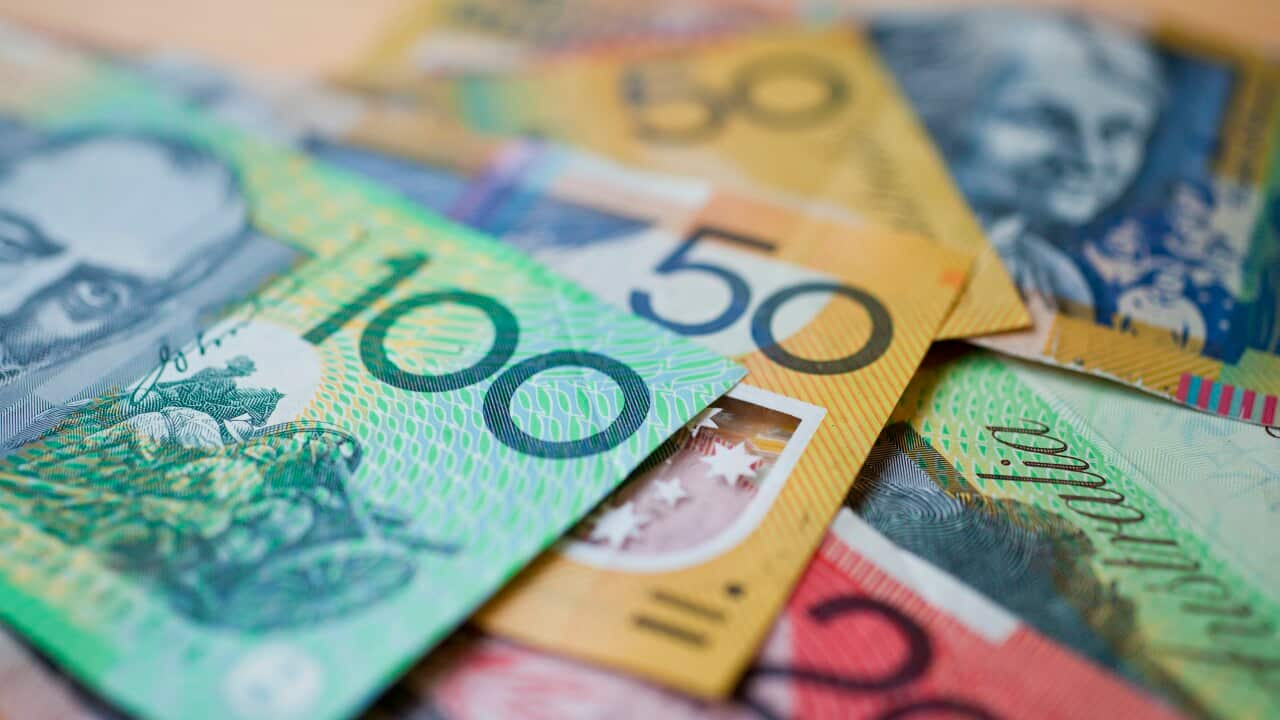Listen to Australian and world news and follow trending topics with SBS News Podcasts.
TRANSCRIPT
More than three million Australian adults have experienced harm from gambling in the past year, with participation on the rise and gamblers losing significant amounts of money.
A study of almost 4000 people by the Australian Gambling Research Centre at the Australian Institute of Family Studies found 65 per cent had gambled at least once in the past year.
More than 30 per cent said they gambled at least monthly.
Lotteries were the most common activity, followed by scratch tickets, poker machines, race betting and sports betting.
Men were more likely than women to gamble regularly and were also more likely to engage in riskier forms such as race and sports betting.
An estimated 3.1 million adults have experienced harms such as feeling guilty and stressed about their gambling, borrowing money or selling things to fund gambling or going back another day to try to win back lost money.
Dr Gabriel Tillman from the Australian Gambling Research Centre says a significant percentage of those who were classified as problem gamblers, were also more likely to experience thoughts of self harm.
"If we're talking about those high risk gamblers, that's about 550,000 people. And so of those people, 16 per cent are experiencing suicidal thoughts, and so that's the kind of magnitude we're talking about. That means they're going without food, missing their bills, borrowing money."
Aussies collectively lose $32 billion on legal forms of gambling every year, the largest per capita losses of any country in the world.
Almost 20 per cent of people whose partner gambled weekly or more frequently reported experiences of intimate partner violence, compared to seven per cent of those whose partners did not gamble.
Young adults were found to be particularly affected, with 18 to 24-year-olds who gamble regularly almost twice as likely to be at high risk of harm compared to older age groups.
Dr Charles Livingstone from Monash University studies gambling trends Australia.
"I mean, one of the problems that young people experience, I would suggest no one has been brought up in our history in an environment where they're constantly bombarded with the promotion of gambling around sport, around normal activities. You can't go and watch a football game without being bombarded with some promotion of gambling. So what we've got is this sort of mad social experiment where young people are being bombarded with gambling advertising from a young age, and we expect that it's all going to come out right? "
Among Indigenous Australians, 27 per cent reported experiencing gambling harms, which was almost double the rate of non-Indigenous Australians.
Dr Livingstone says while people from non-English speaking backgrounds don't gamble at the same rates as the general population, when they do they tend to develop an addiction more readily than people from the mainstream Australian community.
This man, who wants to conceal his identity is one among many who've lost their family, home and livelihoods after succumbing to a pokie addiction.
He told SBS Arabic that he has tried to stop many times.
"I couldn't. I didn't stop because when I see in my pocket, maybe $10, $20, $30, I go to play. I go to play and I lose it and I come back very upset. Many, many times. Many times. Always, always when I go to club, when I come back, I said, oh, this is the last time I am going because I don't want to lose my money straight away. I go, next time when I have more money. Sorry this is a problem.. this is my problem."
So why do people gamble?
It can be a form of socialising, seeing the same bunch of people in a club for example.
It can also be a way to cope with problems or escape feelings of depression and isolation.
Various studies have shown that the brain releases the feel-good chemical dopamine when gamblers have a win or a near win.
But research also shows the brain is flexible and even if a habit has been formed, people can change and break that habit through counselling and other therapies.
Mandy Zhang is a financial counsellor with welfare service EACH.
She works with many different communities including the Chinese community.
"The first step is to talk to someone that just like even it's a small step but it's a big step. Someone you can trust. A friend, family member you know a counsellor even help line like you know the gambler's helpline as well, And because our team has cultururally diverse counsellor, not just Chinese they speak different language and different backgrounds that can help."
Ms Zhang says many gambling counselling services are free and open to everyone.
"Definitely counselling for free and also it's confidential as well. And the people when they come into the service, we assess their situation and see if they need to be referred out or they want to continue the counselling service. We have finance counselling service as well. We have group session and we can refer to another appropriate service if they need it. Anyone can access the service, everything for free, open door. Anyone can access the service."
The federal government is hoping to have a response to a landmark gambling harm inquiry finalised by the end of 2025, after the final report was handed down by late Labor MP Peta Murphy in mid-2023.
The keystone recommendations were a ban on gambling advertising and inducements.
Government efforts to establish a self-exclusion register and self-imposed limits did not adequately address the modern realities of gambling.
The alliance for Gambling Reform largely blames advertising - it's planning its own campaign against betting ads at next year's AFL grand final.
Martin Thomas is the CEO from the Alliance for Gambling Reform.
"Anything is better than the status quo because, we have 1 million gambling ads on our screens every year and it's just impossible to miss the ads and it's driving the surge in gambling, particularly among kids but also young men as well."
National Gambling Helpline 1800 858 858
Lifeline 13 11 14













